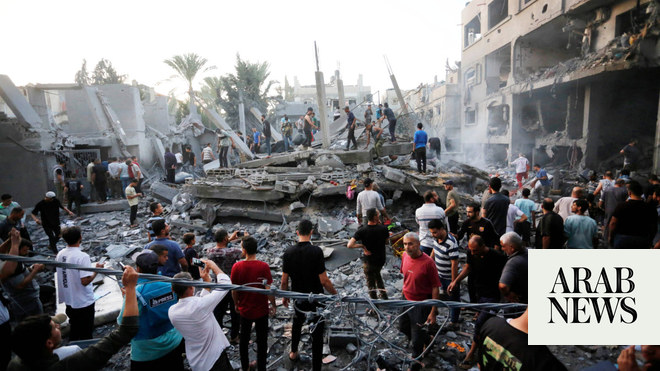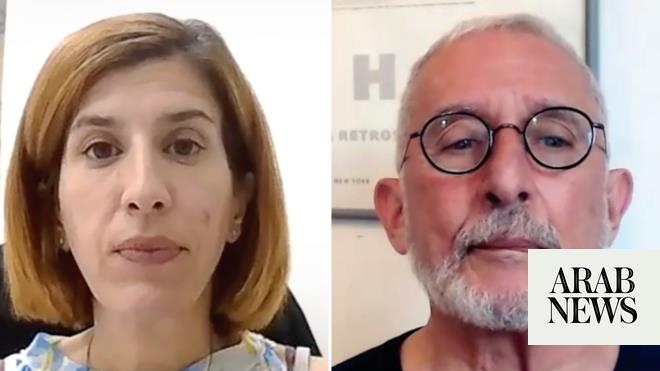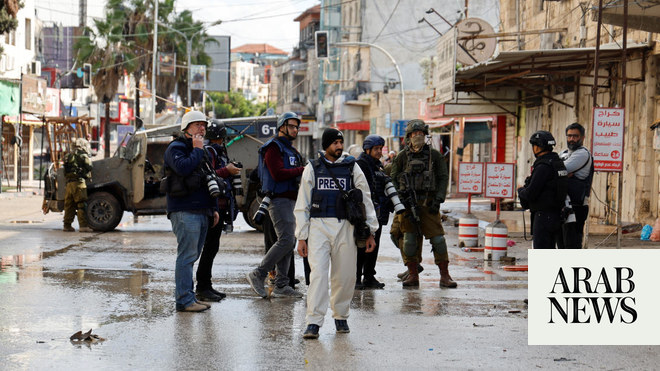
CHICAGO: The office of the Associated Press (AP) in Gaza City, which was destroyed by the Israeli bombing of Al-Jalaa tower last weekend, is just one of 18 media sites attacked by Israel during its current conflict with the Palestinians.
The shocking figure was given on Wednesday, during a discussion on a US radio show sponsored by Arab News, by Ignacio Miguel Delgado, a specialist on the Middle East and North Africa with the Committee to Protect Journalists (CPJ). The non-profit global organization promotes press freedom and defends the rights of journalists.
In addition, an Israeli and a Palestinian journalist who also took part in the discussion said they are forced to work under oppressive restrictions that include censorship of their reports by the Israeli Defense Forces (IDF) or the Palestinian National Authority.
Delgado said that while journalists in many countries in the region, including Syria and Iraq, face great risks, those who are covering the Israeli-Palestinian conflict face the greatest personal danger.
“The situation right now for journalists in the Gaza Strip is very dire,” he said. “Right now they are either covering the news and covering the air strikes and military operations, or running for cover because they have nowhere to hide.
“So far we have documented the destruction of at least 18 media outlets. There may be more but, so far, that is what we documented. Three buildings hosting and housing these media outlets, production companies and broadcast services were bombed to the ground.
“The justification for that by the IDF is that Hamas was using these buildings for military purposes but so far we haven’t seen any evidence of that activity and we would like to see that if that is the case.”
Israeli forces intentionally targeted and destroyed Al-Jalaa tower on May 15. In addition to the AP offices, the building also housed Al Jazeera and several other media operations. The IDF said it was also used by Hamas militants but the AP and the CPJ said there is no evidence of this.
Delgado said there is evidence, however, that Israel is targeting journalists who report on the destruction by Israeli forces of civilian targets, as well as alleged military targets.
“A few days before the bombing of Al-Jalaa building there were two (other) buildings (destroyed): the Jawhara building and Al-Sharouk building, which were housing several local media outlets — Al-Mamlaka channel from Jordan, for example,” Delgado said. “Others were housing the Hamas-affiliated Al-Aqsa TV. There were plenty of local-media outlets.
“And the problem is that with the destruction of these buildings, many journalists have lost their equipment. They were given some time to evacuate the buildings but they of course couldn’t take everything with them — all their broadcasting equipment, cameras and such. So many journalists are now deprived of the tools to do their jobs properly.”
The Israeli military contacted the 18 targeted media locations to give them advance warning of the attacks and a chance to evacuate. However, several journalists have been killed or injured during the current and previous conflicts.
“In Gaza we have seen at least 18 journalists killed since the CPJ started to keep records in 1992,” Delgado said. “In this conflict, we woke up today to the news of the killing of a journalist. We have had another three journalists killed who were covering air strikes in Gaza. The region is one of the most dangerous regions for journalists.”
Israeli journalist Andrew Friedman, from Efrat, and Palestinian journalist Mohammed Najib, from Ramallah, told Hanania that they are forced by the Israeli and Palestinian governments to censor their reports on the conflict.
“In this ongoing mini-war, the IDF didn’t allow the international media to enter Gaza since the start of the mini-war for nine days; today (Wednesday) was the first day that they allowed foreign correspondents to enter the Gaza to cover this war,” Najib said from his offices in Ramallah in the occupied West Bank, where he has worked as a freelance reporter for The New York Times, Wall Street Journal and other major publications.
“More than that, everyone saw the bombing of Al-Jalaa Tower in Gaza (which was based) on allegations that Hamas is based at that tower — but all the reports from Gaza deny that.”
Friedman, a former op-ed editor at the Jerusalem Post and former editor of Yedioth Aharonoth, acknowledged that like Palestinian reporters, Israeli journalists are also faced with official censorship and an audience that is hostile to the opposing viewpoint. But he said he does not think the IDF is intentionally targeting the news media in Gaza or anywhere else.
“It’s certainly true that many Israelis feel an unrepentant hostility toward the media,” he said. “I find it difficult to believe the army is going after the media intentionally.
“First of all I think the army has better things to do. But … with all due respect to Ignacio, who is a very good reporter, if the building was under the use of Hamas, I don’t think he would be free to report that. If he did, he wouldn’t be able to go back to Gaza and report that anymore.”
However, Friedman added: “I don’t have a lot of confidence in the military’s justification, and I don’t have a lot of confidence in the Palestinian side’s accusations.
“For Israelis and their supporters, the story is absolutely clear: small Jewish country attacked by rockets — what do you want them to do? From the perspective of Palestinians and their supporters, it is equally clear: an occupied country under attack in Jerusalem and in Gaza — what do you want them to do?”
Najib agreed that the public in both Palestine and Israel expect journalists to promote their side of the conflict, rather than remain objective.
“I can say after (many) years in journalism, the most difficult job is to be a journalist,” he said. “According to the Palestinian culture and the Israeli culture, (the people) ask, ‘Are you for us or against us?’
“And I tell them, why I should be classified or defined to be with you or against you. I am not against anyone. We must be professional journalists.”
* The Ray Hanania Radio Show is broadcast live on WNZK AM 690 Radio in Detroit and on WDMV AM 700 Radio in Washington DC on the US Arab Radio Network, and is sponsored by Arab News. For more information about the show and to listen to previous episodes, visit ArabNews.com/RayRadioShow.










